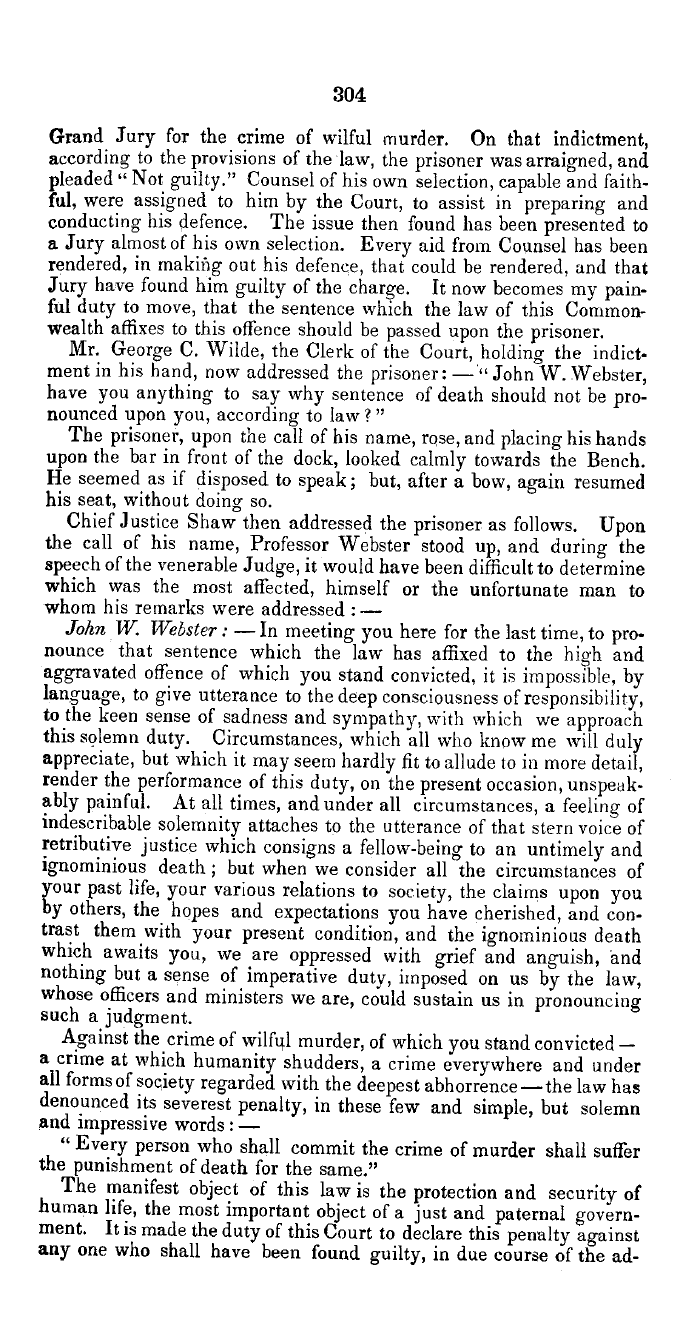|
304
Grand Jury for the crime of wilful murder. On that indictment,
according to the provisions of the law, the prisoner was arraigned, and
pleaded " Not guilty." Counsel of his own selection, capable and faith-
ful, were assigned to him by the Court, to assist in preparing and
conducting his defence. The issue then found has been presented to
a Jury almost of his own selection. Every aid from Counsel has been
rendered, in making out his defence, that could be rendered, and that
Jury have found him guilty of the charge. It now becomes my pain-
ful duty to move, that the sentence which the law of this Common-
wealth affixes to this offence should be passed upon the prisoner.
Mr. George C. Wilde, the Clerk of the Court, holding the indict-
ment in his hand, now addressed the prisoner: - 1° John W. Webster,
have you anything to say why sentence of death should not be pro-
nounced upon you, according to law ? "
The prisoner, upon the call of his name, rose, and placing his hands
upon the bar in front of the dock, looked calmly towards the Bench.
He seemed as if disposed to speak; but, after a bow, again resumed
his seat, without doing so.
Chief Justice Shaw then addressed the prisoner as follows. Upon
the call of his name, Professor Webster stood up, and during the
speech of the venerable Judge, it would have been difficult to determine
which was the most affected, himself or the unfortunate man to
whom his remarks were addressed : -
John W. Webster: - In meeting you here for the last time, to pro-
nounce that sentence which the law has affixed to the high and
aggravated offence of which you stand convicted, it is impossible by
language, to give utterance to the deep consciousness of responsibility,
to the keen sense of sadness and sympathy, with which we approach
this solemn duty. Circumstances, which all who know me will duly
appreciate, but which it may seem hardly fit to allude to in more detail,
render the performance of this duty, on the present occasion, unspeak-
ably painful. At all times, and under all circumstances, a feeling of
indescribable solemnity attaches to the utterance of that stern voice of
retributive justice which consigns a fellow-being to an untimely and
ignominious death ; but when we consider all the circumstances of
your past life, your various relations to society, the claims upon you
by others, the hopes and expectations you have cherished, and con-
trast them with your present condition, and the ignominious death
which awaits you, we are oppressed with grief and anguish, and
nothing but a sense of imperative duty, imposed on us by the law,
whose officers and ministers we are, could sustain us in pronouncing
such a judgment.
Against the crime of wilful murder, of which you stand convicted -
a crime at which humanity shudders, a crime everywhere and under
all forms of society regarded with the deepest abhorrence-the law has
denounced its severest penalty, in these few and simple, but solemn
and impressive words: -
'° Every person who shall commit the crime of murder shall suffer
the punishment of death for the same."
The manifest object of this law is the protection and security of
human life, the most important object of a just and paternal govern-
ment. It is made the duty of this Court to declare this penalty against
any one who shall have been found guilty, in due course of the ad-
|

